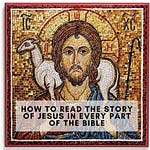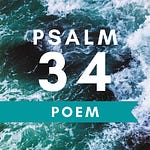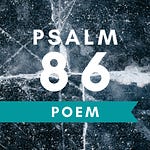Rendition of Psalm 34
Lord, you are my hallow and hope.
I tell of your marvels.
My life is your boast.
May those who are cast off
Take comfort and consolation.
May the rumor of God grow great among us.
I sought the Lord and he found me.
My fears were shadows that fled
For he shone. I forgot
All the things my shame had given me.
I shook inside his grip and slipped,
But I was still safe.
The Lord encamps around those who fear him.
He remains their deliverance.
Oh, taste and see that the Lord is good.
He keeps all who make him their refuge.
He is the Fear that hallows his holy ones.
He is the feast the hungry lack.
He is the goodness that draws them back.
Come, children, listen.
I will teach you the fear of the Lord.
If you want life and you love your days,
Come take his goodness.
Do not let your mouth make evil,
Nor your tongue builds deceptions.
Turn aside from evil and choose the good.
Search for flourishing and fly toward it.
God watches the righteous
And listens for their cries for help.
He turns from those who make evil
And they are cut off.
The righteous raise their prayers to him
And he is swiftly at their side.
He draws nearer to the brokenhearted than they know.
He saves and frees those who have been
Crushed, bruised, and snuffed out.
Though the afflictions, fears, and wounds
Of the righteous teem against them,
The Lord delivers his people out of them all.
They are pressed but unbroken,
But the wicked meet their own afflictions,
And are condemned by their own hate.
The Lord saves his servants.
None who shelter in him will be condemned.
Notes on the Rendition
“Soul” Isn’t Spirit
Though the ESV and other modern translations translate nephesh as “soul,” I can’t help but translate it as “life” instead. The connotations around the modern English word “soul” are so far from the way that nephesh is used (683 times) in the Old Testament.
For instance:
Nephesh as “living beings”—“And God said, “Let the earth bring forth living creatures (nephesh) according to their kinds. (Genesis 1:24)
Nephesh as “life”—“From his fellow man I will require a reckoning for the life (nephesh) of man.” (Genesis 9:5)
Nephesh as “appetite”—“My appetite (nephesh) refuses to touch them; they are as food that is loathsome to me.” (Job 6:7)
Nephesh as “neck or throat”— “O God, you are my God; earnestly I seek you; my soul (nephesh) thirsts for you…” (Psalm 63:1)
Those examples are miles away from what modern people think of when we think of the word “soul.”
As many authors have noted, the English word “soul” has undergone a de-physicalization. Modern thought makes a (non-biblical) divide between the physical (the secular realm) and the spirit (the sacred realm). That isn’t to say that the Bible doesn’t distinguish between things that are embodied (like humans) and things that are not (like God). It does. It is just to say that we have laid much more emphasis on it than the Bible does.
For instance, what do you think of when you hear the phrase “go to heaven?”? Do you picture your body going into the ground after you die, but your invisible, non-physical soul living for eternity in the invisible, non-physical heavenly realm? That isn’t what the Old Testament writers had in mind when they used the word nephesh at all. And it isn’t what the New Testament writers had in mind when they wrote about the state beyond death. Biblically, heaven comes down to earth. We don’t go to heaven. The New Creation is physical, not a place for disembodied souls. The words translated as “soul” in the Bible shouldn’t necessarily be understood as spirit.
So in the translation of Psalm 34, I changed “My soul makes its boast in the Lord” (ESV) to “My life is your boast.” See what a difference it makes! The former is talking about something attitudinal, something happening inside your head. The former is talking about something visible, something that includes your whole life, attitudes, and actions.
“My life is your boast” is much closer to the thing God is trying to make when he made humans in his image—a physical, visible, living demonstration of his nature and ways. Our lives are supposed to be his boast. They are supposed to be proclamations that God is real.
On the other hand, “My soul makes its boast in the Lord” fits more comfortably with an individualized, modernized gospel in which internal states determine one’s eternal state. The modernized gospel makes it easier to sit in church and imagine that agreeing with the things that are said is the same thing as being a Christian. It isn’t. Faith always runs rampant in the life of a Christian. It doesn’t confine itself to the confines of one’s head. It tips over tables and starts driving out the money changers until your whole life is a boast the Lord makes. I am real, God says to all who enter the circle of your influence, who get in arms reach of your life, your nephesh.
That is what it means to be a soul (read: living being) made in God’s image.
Psalms: 1, 2, 3, 4, 5, 6, 7, 8, 9, 10, 11, 12, 13, 14, 15, 16, 18, 19, 20, 21, 22, 23, 24, 25, 26, 27, 28, 29, 31, 32, 34, 35, 38, 39, 40, 42, 43, 46, 50, 51, 53, 54, 62, 63, 65, 66, 73, 74, 75, 84, 86, 88, 90, 91, 100, 107, 110, 114, 117, 118, 119, 120, 121, 122, 123, 124, 125, 126, 127, 128, 129, 130, 131, 132, 133, 134, 137, 139, 140, 142, 147, 148.
Request the Darkling Psalter in Print
If you would like to move this project one step closer to publication, sign up on this form to request the Darkling Psalter in print.













Share this post